
Kevin Spacey Fowler, known professionally as Kevin Spacey, is an American actor, producer, and singer. Spacey began his career as a stage actor during the 1980s, obtaining supporting roles in film and television. He gained critical acclaim in the 1990s that culminated in his first Academy Award for Best Supporting Actor for the neo-noir crime thriller The Usual Suspects (1995) and an Academy Award for Best Actor for the midlife crisis-themed drama American Beauty (1999).
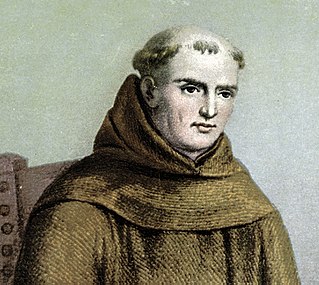
Saint Junípero Serra y Ferrer, O.F.M., was a Roman Catholic Spanish priest and friar of the Franciscan Order who founded a mission in Baja California and the first nine of 21 Spanish missions in California from San Diego to San Francisco, in what was then Alta California in the Province of Las Californias, New Spain. Serra was beatified by Pope John Paul II on September 25, 1988, in the Vatican City. Pope Francis canonised him on September 23, 2015, at the Basilica of the National Shrine of the Immaculate Conception in Washington, D.C., during his first visit to the United States. His missionary efforts earned him the title of Apostle of California.

Harry Dean Stanton was an American actor, musician, and singer. In a career that spanned more than six decades, Stanton played supporting roles in the films Cool Hand Luke (1967), Kelly's Heroes (1970), Dillinger (1973), The Godfather Part II (1974), Alien (1979), Escape from New York (1981), Christine (1983), Repo Man (1984), Pretty in Pink (1986), The Last Temptation of Christ (1988), Wild at Heart (1990), The Straight Story (1999), The Green Mile (1999), Alpha Dog (2006) and Inland Empire (2006). He was given rare lead roles in Wim Wenders' classic Paris, Texas (1984) and Lucky (2017), his last film.

Robert John Downey Jr. is an American actor, producer, and singer. His career has been characterized by critical and popular success in his youth, followed by a period of substance abuse and legal troubles, before a resurgence of commercial success in middle age. In 2008, Downey was named by Time magazine among the 100 most influential people in the world, and from 2013 to 2015, he was listed by Forbes as Hollywood's highest-paid actor. His films have grossed over $14.4 billion worldwide, making him the second highest-grossing box-office star of all time.

Benjamin Bratt is an American actor, producer, and activist. Bratt gained exposure through his supporting roles in Bright Angel (1990), Demolition Man (1993), Clear and Present Danger (1994), and The River Wild (1994). From 1995, he extended his global recognition with his role of NYPD Detective Rey Curtis on the NBC drama series Law & Order.

The Call of the Wild is a short adventure novel by Jack London, published in 1903 and set in Yukon, Canada, during the 1890s Klondike Gold Rush, when strong sled dogs were in high demand. The central character of the novel is a dog named Buck. The story opens at a ranch in Santa Clara Valley, California, when Buck is stolen from his home and sold into service as a sled dog in Alaska. He becomes progressively feral in the harsh environment, where he is forced to fight to survive and dominate other dogs. By the end, he sheds the veneer of civilization, and relies on primordial instinct and learned experience to emerge as a leader in the wild.
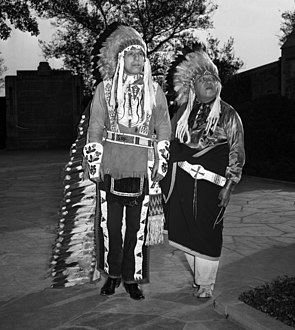
Iron Eyes Cody was an Italian-American actor. He portrayed Native Americans in Hollywood films, famously as Chief Iron Eyes in Bob Hope's The Paleface (1948). He also played a Native American shedding a tear about litter in one of the country's most well-known television public service announcements, "Keep America Beautiful". Living in Hollywood, he began to insist, even in his private life, that he was Native American, over time claiming membership in several different tribes. In 1996, Cody's half-sister said that he was of Italian ancestry, but he denied it. After his death, it was revealed that he was of Sicilian parentage, and not Native American at all.
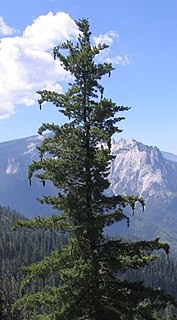
Pinus lambertiana is the tallest and most massive pine tree, and has the longest cones of any conifer. The species name lambertiana was given by the British botanist David Douglas, who named the tree in honour of the English botanist, Aylmer Bourke Lambert. It is native to the mountains of the Pacific coast of North America, from Oregon through California to Baja California.

Timothy Tarquin Hutton is an American actor and director. He is the youngest recipient in the Best Supporting Actor Category of the Academy Awards, for his performance as Conrad Jarrett in Ordinary People (1980). Hutton has since appeared regularly in feature films and on television, with featured roles in the drama Taps (1981), the spy film The Falcon and the Snowman (1985), and the horror film The Dark Half (1993), among others.

James Pierson Beckwourth, born James Beckwith and generally known as, Jim Beckwourth was an American mountain man, fur trader, and explorer. James was also famously known as "Bloody Arm" because of his skill as a fighter. He was mixed-race and born into slavery in Virginia. He was freed by his white father, and apprenticed to a blacksmith so that he could learn a trade.
Jason Shannon Acuña, better known by his stage name Wee Man, is an American actor, stunt performer, professional skateboarder, and television personality. He is one of the stars of Jackass on MTV and the host of Fox Sports Net's skateboarding show 54321.

Edward Laurence Heimberger, known professionally as Edward Albert, was an American film and television actor. The son of actor Eddie Albert, he is best remembered for his breakout starring role in Butterflies Are Free (1972) opposite Goldie Hawn, for which he won the Golden Globe Award for New Star of the Year and was nominated for Best Actor in a Motion Picture - Musical or Comedy. He starred in over 130 films and television series, including Midway, The Greek Tycoon, Galaxy of Terror, The House Where Evil Dwells, The Yellow Rose, Falcon Crest, and Power Rangers Time Force.

The Squaw Man is a 1914 silent western drama film directed by Cecil B. DeMille and Oscar C. Apfel, and starring Dustin Farnum. It was DeMille's directorial debut and the first feature film to be shot in what is now Hollywood.
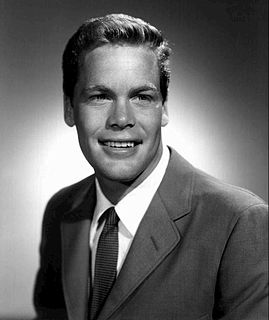
Douglas Osborne McClure was an American actor whose career in film and television extended from the 1950s to the 1990s. He is best known for his role as the cowboy Trampas during the entire run from 1962 to 1971 of the NBC Western series, The Virginian, loosely based on the Owen Wister novel.

Samuel Pack Elliott is an American actor. His lanky physique, thick moustache, deep, resonant voice, and Western drawl have led to frequent roles as cowboys and ranchers. His accolades include an Academy Award nomination, two Golden Globe Award nominations, two Primetime Emmy Award nominations, and a National Board of Review Award for Best Supporting Actor.

Mr. Robinson Crusoe is a 1932 Pre-Code American film. It is one of the few "talkie" films starring Douglas Fairbanks, Sr., in his penultimate film role; Fairbanks also produced the film and provided the story. The film was directed by A. Edward Sutherland, a veteran silent film director, for Fairbanks's Elton Productions, and released by United Artists. Steve Drexel shows a fiery optimism and can-do spirit that matches the Fairbanks screen persona that appears in his most popular films.

John R. "Johnny" Cash was an American singer, songwriter, musician, actor, and author. He is one of the best-selling music artists of all time, having sold more than 90 million records worldwide. His genre-spanning songs and sound embraced country, rock and roll, rockabilly, blues, folk, and gospel. This crossover appeal won Cash the rare honor of being inducted into the Country Music, Rock and Roll, and Gospel Music Halls of Fame.
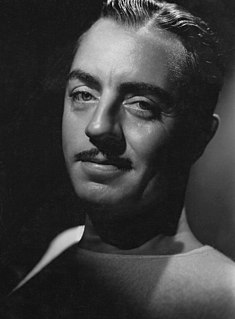
William Horatio Powell was an American actor. A major star at Metro-Goldwyn-Mayer, he was paired with Myrna Loy in 14 films, including the Thin Man series based on the Nick and Nora Charles characters created by Dashiell Hammett. Powell was nominated for the Academy Award for Best Actor three times: for The Thin Man (1934), My Man Godfrey (1936), and Life with Father (1947).

The Romance of Tarzan is a 1918 American silent action adventure film directed by Wilfred Lucas starring Elmo Lincoln, Enid Markey, Thomas Jefferson, and Cleo Madison. The movie was the second Tarzan movie ever made, and is based on Edgar Rice Burroughs' original novel Tarzan of the Apes. It adapts only the second part of the novel, the earlier portion having been the basis for the preceding film Tarzan of the Apes (1918). Less popular than its predecessor due to much of the action taking place in the wild west rather than Africa, the film has not been preserved, and no prints of it are known to survive today.
The Madesi tribe are an indigenous group of Native Americans who once thrived in the Madesi Valley in northeastern California of the United States. The Madesi is one of nine autonomous bands of the Pit River Tribe, that traditionally speak various dialects of a common language, which is sometimes referred to as the "Achomawi" language, or more commonly "Pit River Talk". The other two bands of the Pit River Tribe speak dialects of a second, distinct but related language, called by anthropologists Atsugewi. The traditional Madesi band territory is the most down-stream section of the river Ahjoo-mah in the Pit River Tribal territory. The Madesi territory was historically along and the Pit River from the south end of Big Valley Mountains, westerly to Pit River Falls. The other eight tribes that share the Achomawi language also had an historic homeland located along other parts of the Pit River. Their territory extended from Madesi Valley to Goose Lake. This land was also home to the Atsugewi language group, which consisted of two distinct tribes living in the Hat Creek Valley and Dixie Valley, south of the Achomawi language bands.

















